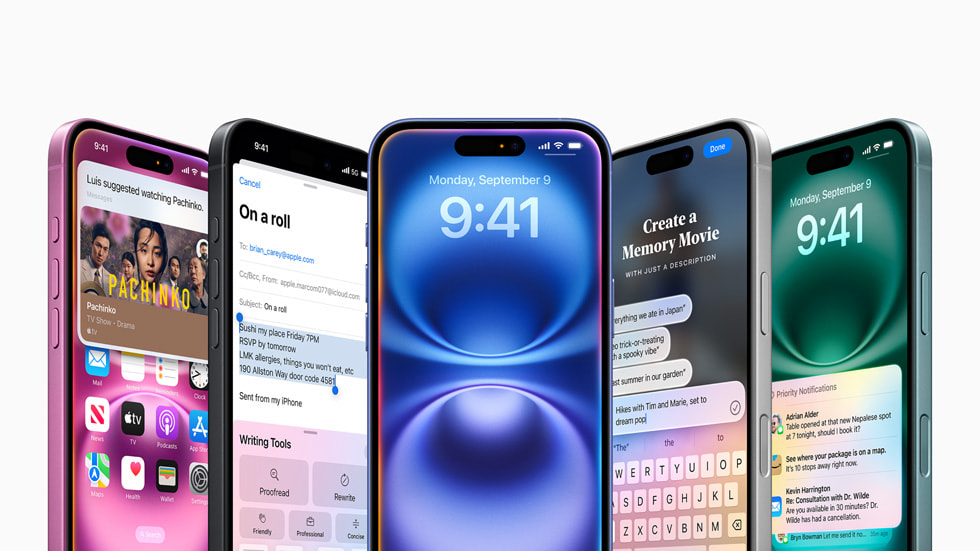 |
Apple debuts the iPhone 16 series on Tuesday. (Apple) |
Apple has launched the first generation of its artificial intelligence-focused smartphone series, the new iPhone 16 and iPhone 16 Pro, which are highly anticipated to go up against its rival Samsung Electronics' Galaxy S24, touted as the "world's first AI smartphone."
To the disappointment of users in South Korea and countries outside the US, however, Apple is expected to introduce the full and multilingual version of its much-hyped Apple Intelligence next year.
“The next generation of iPhone has been designed for Apple Intelligence from the ground up,” Apple CEO Tim Cook said during the company’s presentation, dubbed "Glowtime." "It marks the beginning of an exciting new era.”
According to Apple, the beta version of Apple Intelligence will be released in American English in October. Other languages are expected to come next year, along with a comprehensive update package, including an overhaul of the Siri voice assistant and ChatGPT features, which will not be available until early next year.
Apple seeks to reverse its sales slump with the AI-enhanced iPhone 16 line. Facing stiff competition and regulations in its major markets in China and Europe, the company has included a number of new markets, such as Korea, in its 59 initial launch countries for the first time.
Apple has also decided to freeze the launch price of the iPhone 16 series at the same level as the previous iPhone 15 line, a move to keep its competitive edge against Samsung's Galaxy smartphone series. Before the unveiling, Apple was largely anticipated to raise the price, reflective of the significant rise in chip prices.
The half-baked plan for Apple Intelligence, however, will not be a key selling point for Korean users, analysts here say.
"The main highlight (of the iPhone 16 release) was how complete Apple Intelligence is. But there was nothing particularly new," said Park Sang-hyun, a researcher at Korea Investment and Securities.
Market tracker Counterpoint Research said the use cases known so far for Apple Intelligence are "not enough" to persuade users to upgrade their phones, especially when the replacement cycle is observed to be lengthening overall.
There is still room for Apple Intelligence gradually to increase its influence on iPhone sales, the market tracker added.
Apple said it has incorporated the latest application processor chipsets, the A18 and A18 Pro in the iPhone 16 and iPhone 16 Pro models, for faster and more efficient operation of Apple Intelligence.
The features currently revealed appear to be similar to those of the Galaxy S24 series, which is Samsung Electronics' first AI-centric smartphone.
Using Apple Intelligence's Writing Tools, users would be able to refine their words by rewriting, proofreading and summarizing text in most apps, including third-party apps.
In the photos app, an AI feature will create videos for users to recall memories, and users will be able to remove distracting objects in photos with the "Clean Up" tool.
While voice recording on iPhones has been banned in Korea, it may be available via the phone app when Apple Intelligence is released here next year. Similar to Galaxy AI, Apple Intelligence will be able to record and transcribe calls and audio files.
During the unveiling event, Apple also introduced new versions of its smartwatches and Airpods. The new iPhone 16 line devices will be released in Korea on Sept. 20.
Meanwhile, Samsung Electronics is aiming to further expand the presence of its Galaxy AI before the launch of its upcoming Galaxy S25 series early next year.
Samsung Electronics has ramped up subsidies to promote new purchases of its Galaxy S24 series in Korea, in a move to protect its market share.
The smartphone maker released the One UI 6.1.1 update which enhances the Galaxy AI incorporated in the Galaxy S24 series, and is also working to enable use of the Galaxy AI in older models such as the Galaxy S23 and Galaxy S22 as well as the Galaxy Z Fold 4 and Galaxy Z Flip 4.





![[Herald Interview] How Gopizza got big in India](http://res.heraldm.com/phpwas/restmb_idxmake.php?idx=644&simg=/content/image/2024/11/20/20241120050057_0.jpg)

